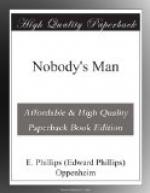Tallente, fully appreciating the atmosphere, nevertheless made strenuous and not unsuccessful efforts to pick up the old threads. He abandoned even the moderation of his daily life. He drank cocktails, champagne and port, laughed heartily at the stories of the day and ransacked his brain to cap them. Of bridge, unfortunately, he knew nothing, but he played pool with some success, and left the club late, leaving behind him curiously mingled opinions as to the cause for this sudden return to his old haunts.
He himself walked through the streets, on his way homeward, conscious of at least partial success, feeling the pleasurable warmth of the wine he had drunk and the companionship for which he had so strenuously sought. He found himself thinking almost enviously of the men with whom he had associated,—Philipson, with whom he had been at college, with three plays running at different theatres, interested, even fascinated by his work, chaffing gaily with his principal actor as to the rendering of some of his lines. Then there was Fardell, also a schoolfellow, now a police magistrate, full of dry and pleasant humour, called by his intimates “The Beak “; Amberson, poseur and dilettante thirty years ago, but always a good fellow, now an acknowledged master of English prose and a critic whose word was unquestioned. These men, one and all, seemed to be up to the neck in life, kept young and human by the taste of it upon their palate. The contemplation of their whole-sided existence, their sound combination of work and play, produced in him a sort of jealousy, for he knew that there was something behind it, which he lacked.
The night was bright and dry and there were still crowds about Leicester Square, Piccadilly Circle and Piccadilly itself. As he walked, he looked into the faces of the women who passed him by, struggling against his old abhorrence as against one of the sickly offshoots of an over-eclectic epicureanism. They typified not vice but weakness, the unhappy result of man’s inevitable revolt against unnatural laws. Yet even then the mingled purity and priggishness encouraged by years of repression forbade any vital change in his sentiments. The toleration for which he sought, when it made its grudging appearance, was mingled with dislike and distrust. He breathed more freely as he turned into the quieter street in which his rooms were situated, passing them by, however, crossing Curzon Street and embarking upon a brief pilgrimage which had become almost a nightly one. Within a very few minutes he paused before a certain number in a street even more secluded than his own. At last the thing which he had so greatly anticipated had happened. There were lights in the house from top to bottom. Jane had arrived!
He walked slowly back and forth several times. The music in his blood, stirred already by the wine he had drunk and the revival of old memories, moved to a new and more wonderful tune. He knew now, without any possibility of self-deception, exactly what he had been waiting for, exactly where all his thoughts and hopes for the future were centered. Was she there now, he wondered, gazing at the windows like a moon-struck boy. He lingered about and fate was kind to him.




